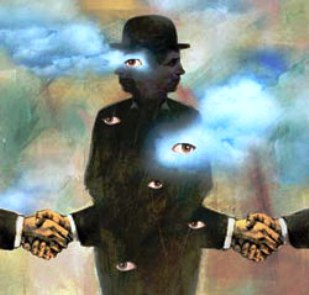“I don’t pick the winner,” Air Force Major General Stephen Goldfein reportedly said, “but if I did, I’d pick SMS.”

That statement comes as part of a report that found that Goldfein helped award a $50 million contract to a favored company. According to the Department of Defense Inspector General’s report, “The investigation found that the December 2005 award to SMS was tainted with improper influence, irregular practices, and preferential treatment.”
Last February, the New York Times ran a front-page story about Presidential candidate John McCain that said that “Even as [McCain] has vowed to hold himself to the highest ethical standards, his confidence in his own integrity has sometimes seemed to blind him to potentially embarrassing conflicts of interest.”
“He is essentially an honorable person,” William Cheshire, a friend of McCain and editor at The Arizona Republic said. “But he can be imprudent.”
What causes public officials to be imprudent?
Why would a high-profile official like John McCain, who openly proclaims himself as “the scourge of special interests,” be seen spending time with the very special interest groups he is presumably fighting against? What would motivate an Air Force General to improperly award a $50 million contract, or Smithsonian officer Pilar O’Leary to abuse her expense account just a year after another Smithsonian official resigned for a similar offense? Don’t these people read the ethics policies within their own organizations? Aren’t they aware of the damage not only to their own reputations but to the public’s trust?
“When there’s a conflict between self-interest and moral principles,” ethicist Michael Josephson points out, “self-interest – in fact, short-term self-interest – will generally prevail.”
Not long ago, I was asked by a local group to make a statement at a city council meeting regarding a clear conflict of interest. The group was opposed to the demolition of an old, possibly historic, building in order to make way for needed housing for a local hospital’s staff.
The group discovered that the architectural historian hired to study and write the report about the building was married to a surgeon employed by the hospital involved in the project.
When the historian presented her report to the Historic Landmark’s Commission she made no mention of any conflict of interest. On the basis of her report, HLC approved her testimony, recommending that the building be torn down. When it became known that her husband worked for the hospital, several on the commission were distressed and said that the study should be reassigned to someone without a potential for bias.
However, before the commission could schedule a meeting to revisit the issue, a staff person told the commissioners, in no uncertain terms, that the city council was set to review the plans for the tear-down and replacement housing and that the city attorney would handle any problems that might arise. Although many on the commission felt they were being bullied, they decided not to press the issue as it was coming before the council in a few days.
I was asked, by the neighborhood group opposed to the tear-down, to make a statement regarding the conflict of interest. In my statement, I made mention of the fact that a councilman had stepped-down from this particular meeting because he lived in the same neighborhood as the building – an ethical policy for all members on the council. I reasoned that if such a policy was required by the council, how could they overlook the clear conflict between the historian who’s spouse works for the hospital in question and whose report is used as the defining determination in the life or death of the building in question?
When the time came for council members to comment, two of the members criticized me for “impugning” the integrity of a respected individual, and added that “everyone knows everyone in this town.”
What the city council, Senator McCain, General Goldfein and Ms. O’Leary fail to recognize is that conflicts of interest – even the appearance of conflicts – violate the public’s trust. Every time a public official can’t recognize or resist such conflicts, the result not only affects the public’s perception of an institution, but weakens the integrity of a process that we all depend upon.
In his 2002 memoir, “Worth Fighting For,” Senator McCain wrote, “I would very much like to think that I have never been a man whose favor can be bought.”
“Ethics,” Michael Josephson reminds us, “is not about what we say or what we intend, it’s about what we do.”
While we can’t legislate morality, we can require moral judgment of our elected officials. Anything less should be unacceptable.
Comments










